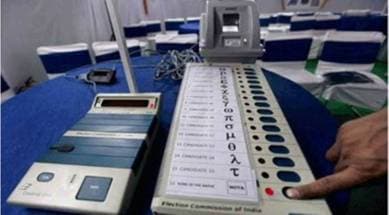Stay updated with the latest - Click here to follow us on Instagram
EC EVM challenge: Only NCP comes forward; AAP, Congress pull out
The two had asked EC to permit tampering of the EVM’s motherboard, which was shot down by the Commission.

A week after the Election Commission (EC) announced an open invitation to all state and national parties to prove allegations of EVM tampering, only one — Nationalist Congress Party (NCP) — came forward to accept the challenge. The ‘EVM Challenge’ will be held on June 3 and wind up in just four hours as opposed to the Commission’s expectation of lasting up to five days.
A total of eight political parties responded to EC’s call. Congress and Aam Aadmi Party (AAP), which spearheaded the anti-EVM movement after their rout in the recently-held state elections, opted out of the exercise claiming that the conditions/rules laid down by the EC for the challenge were unfair.
monthly limit of free stories.
with an Express account.
The two had asked EC to permit tampering of the EVM’s motherboard, which was shot down by the Commission. That apart, four parties — CPI, CPM, BJP and RLD — have only expressed an interest in observing the challenge. The All India NR Congress, formed by former Puducherry Chief Minister N Rangaswamy, informed the Commission that it will not participate in the challenge.
The NCP has nominated three representatives — Vandana Hemant Chavan, Gaurav Jayprakash Jachak and Yasin Hussain Shaikh — who will attempt to prove that the electronic voting machines can be tampered to fudge poll results.
Since the Sharad Pawar-led party has not identified any specific machines it would like to hack, the Commission will for arrange for a few EVMs used in the assembly polls held in Uttar Pradesh, Uttarakhand and Punjab.
On June 3, to prove their allegations, the representatives of NCP will have to demonstrate that poll results can be doctored by either pressing a combination of keys on the Control Unit or Ballot Unit of the EVM or both, or by communicating with the EVM through an external wireless device or bluetooth or mobile phone, over four hours.
The parties would be deemed to have failed the challenge if the EVM shuts down after their tampering attempts, if the voting results remain unchanged, if the challenger violates the EC’s guidelines, and the expert withdraws.
The Commission, however will not permit the experts to either to take the EVMs back with them or to tamper with the mother board of the machine. AAP and Congress had objected to the latter in their letters written to the Commission this week.
“The EVM machine is composed or more components apart from the control unit and the ballot unit. If challengers don’t have access to all components — such as the motherboard — that constitute an EVM, how will they demonstrate their concerns? The EC must factor the possibility that those who would try and tamper with EVMs in real life scenario can do so without pressing buttons on the CU or BU or do it before/after the EVMs are in the control room,” Congress communication department head Randeep Surjewala wrote to Chief Election Commissioner Naim Zaidi.
AAP, too, had demanded that experts be allowed to change the machines motherboard to be able to demonstrate hacking. EC replied saying, “Allowing any change of the motherboard or any internal circuit of the EVM is like saying that anyone should be permitted to manufacture a new machine and introduce newly made EVMs in EC system, which is implausible and irrational”.
EC’s EVM challenge is being held to allay apprehensions regarding the electronic voting machines, which have been in use since the year 2000. Over the last 17 years, EVMs have been deployed for conducting 107 Assembly elections and three Lok Sabha polls.
The machines were also at the centre of a controversy in 2004, after the BJP was shocked by the Congress in that year’s general elections.
The controversy has been revived by the opposition parties that were routed in the recent Assembly elections in five states. The BSP was the first to complain, with Mayawati alleging that largescale EVM tampering was behind the BJP sweep in UP. Later, Delhi Chief Minister Arvind Kejriwal challenged the EC to make EVMs available to the party for 72 hours and claimed that “we will read the code and rewrite it too”.